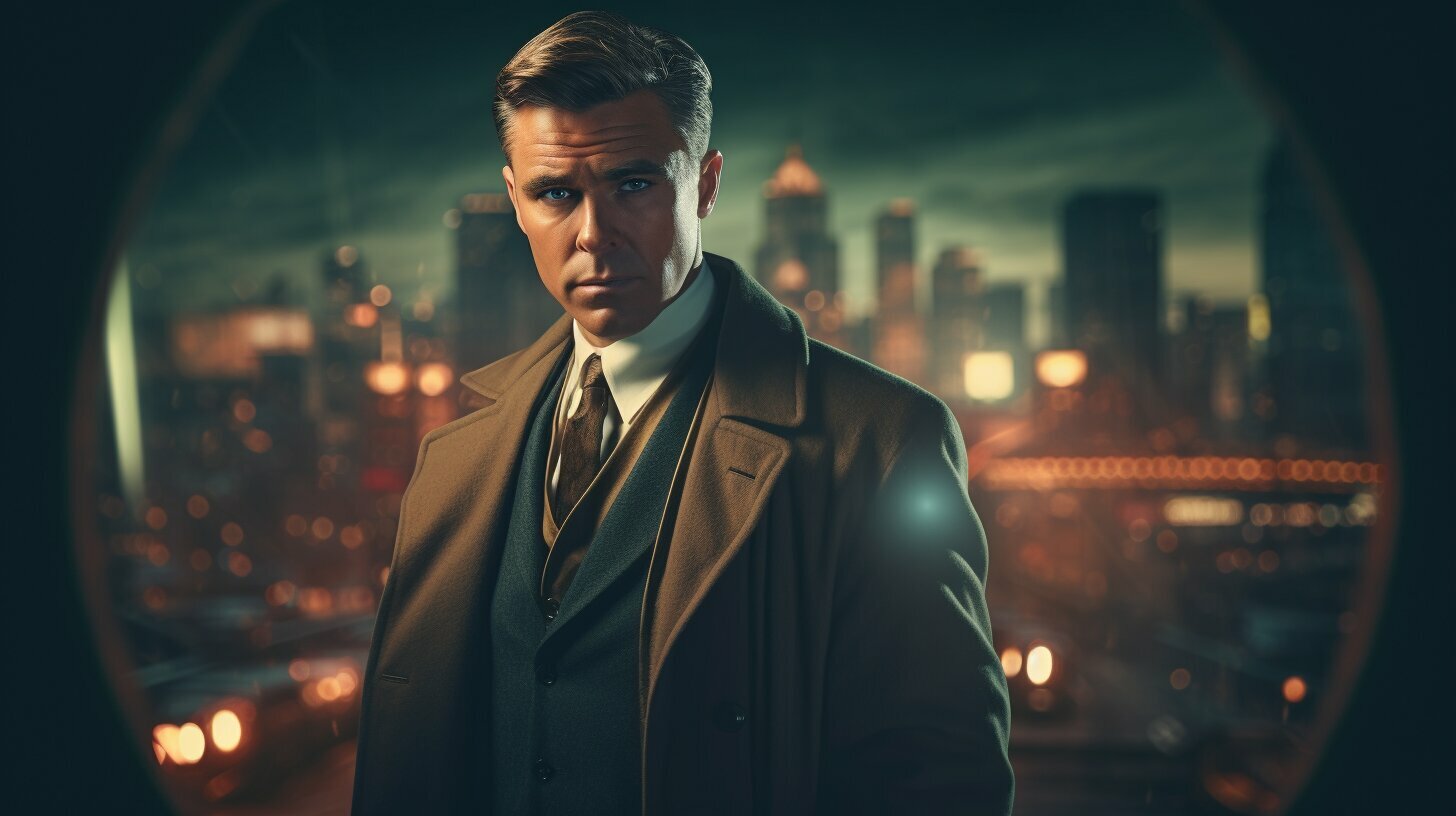Unveiling the Mystery: Why Do Detectives Wear Suits?
Have you ever wondered why detectives opt for the classic suit attire instead of the traditional police uniform? As a journalist, I’ve always been intrigued by this question and decided to explore the reasons behind it. In this article, we will uncover the importance of suits for detectives and how it impacts their investigations.
Key Takeaways:
- Detectives wear suits to blend in with the public and maintain discretion during investigations.
- Suits help protect ongoing investigations by avoiding easy identification.
- Wearing suits allows detectives to present professionalism and establish a boundary between them and the crime scene.
- Personal protective equipment, such as handcuffs and a baton, are carried by detectives even when wearing suits.
- The tradition of detectives wearing suits has endured for over a century and is seen as a symbol of professionalism and authority.
The Significance of Detective Attire
The attire detectives choose to wear plays a crucial role in their ability to effectively carry out investigations. Their clothing serves a purpose beyond mere fashion; it is a strategic choice that impacts their overall effectiveness in the field. The significance of detective attire cannot be understated, as it contributes to their professionalism, helps establish boundaries, and aids in maintaining discretion during delicate operations.
When it comes to detective work, blending in with the public is of paramount importance. By donning suits that resemble the attire worn by many individuals in everyday life, detectives are able to seamlessly assimilate into their surroundings. This allows them to observe and gather information without raising suspicion, enhancing their ability to uncover crucial details that may otherwise go unnoticed. The role of suits in detective investigations cannot be overstated, as it enables them to operate undercover and conduct covert operations with greater efficacy.
Moreover, the choice of attire also plays a key role in establishing professionalism. The sight of a detective in a suit conveys a sense of authority and commands respect, both from suspects and witnesses. The formality of the suit helps establish a boundary between the detective and the crime scene, ensuring that the investigator remains focused on the task at hand. Additionally, the traditional nature of detectives wearing suits has endured for over a century, standing as a symbol of their commitment to the pursuit of justice.
| Examples of Detective Attire | Department | Occasions |
|---|---|---|
| Formal Suit | Homicide Unit | Court Appearances |
| Smart/Casual Attire | Undercover Operations | Surveillance |
| Business Professional | White-Collar Crime Unit | Corporate Investigations |
| Tactical Gear | Special Weapons and Tactics (SWAT) Team | High-Risk Operations |
In conclusion, the significance of detective attire cannot be overlooked. From blending in with the public to establishing professionalism and maintaining discretion, the choice of clothing plays a vital role in the success of their investigations. Whether it be a formal suit, smart/casual attire, or tactical gear, detectives select their attire strategically to suit the specific demands of their job. The enduring tradition of detectives wearing suits not only symbolizes their professionalism and authority but also serves as a reminder of the ongoing commitment to uncovering the truth and ensuring justice.
Blending In and Maintaining Discretion
One of the main reasons detectives opt for suits is to blend in with the public and ensure their investigations remain discreet. The role of a detective often requires them to gather information from witnesses, observe suspects, and conduct surveillance operations without drawing attention to themselves. By wearing a suit, detectives can adopt a more inconspicuous appearance, allowing them to seamlessly blend into various social settings and carry out their duties without arousing suspicion.
Moreover, the choice of attire helps detectives maintain a level of professionalism while on duty. The suit exudes an air of authority and sophistication, which can aid detectives in establishing rapport and gaining the trust of witnesses and informants. It also sets them apart from the uniformed police officers, emphasizing their distinct role as investigators dedicated to solving crimes through meticulous evidence collection and analysis.
When working undercover or in plainclothes, detectives need to protect their identities and avoid compromising ongoing investigations. Wearing suits allows them to shift their appearance easily, making it harder for potential suspects to identify them in subsequent encounters. In situations where quick adaptations are necessary, detectives often rely on their ability to change their clothing and blend into different environments seamlessly.
Personal Protective Equipment
Despite the formal attire, detectives are well-equipped to handle potentially dangerous situations. In addition to their suits, they carry personal protective equipment to ensure their safety and the safety of others. Handcuffs, a baton, and a protective spray are among the tools detectives have at their disposal. These instruments, although discreetly concealed, enable detectives to react swiftly and effectively should the need arise during their investigations.
| Benefits of Detectives Wearing Suits | |
|---|---|
| Blending in with the public | Helps maintain discretion during investigations |
| Establishes professionalism and authority | Creates a boundary between detectives and crime scenes |
| Allows for quick adaptability in changing environments | Symbolizes dedication to meticulous evidence collection and analysis |
Professionalism and Establishing Boundaries
Wearing suits allows detectives to present a level of professionalism and create a clear boundary between themselves and the crime scene. The choice of attire plays a crucial role in distinguishing detectives from other law enforcement personnel and helps them maintain a professional image in the eyes of the public.
With their sharp suits and polished appearance, detectives exude a sense of authority and expertise. This not only instills confidence in the community they serve but also commands respect from potential suspects and witnesses. The attention to detail in their appearance reflects the meticulousness required in their investigations and conveys a message that they mean business.
In addition to professionalism, suits also serve as a physical boundary between detectives and the crime scene. By wearing suits, they create a visual demarcation that sets them apart from the general public and ensures that their presence is recognized as official business. This distinction is vital for preventing contamination of evidence and maintaining the integrity of the investigation.
“To blend in, one must stand out,” as the saying goes. Detectives understand the importance of discretion in their work, and suits aid them in achieving this. By blending in with the public, detectives can silently observe their surroundings, gathering crucial information without arousing suspicion. The nondescript nature of a suit allows them to go unnoticed, increasing the chances of uncovering vital clues and maintaining the element of surprise.
| Benefits of Wearing Suits for Detectives |
|---|
| • Enhances professionalism and authority |
| • Establishes clear boundaries between detectives and the crime scene |
| • Enables blending in with the public for discreet observations |
| • Maintains the integrity of ongoing investigations |
Conclusion
In conclusion, the choice of suits for detectives is a deliberate one, allowing them to blend in, maintain discretion, and present a professional image in their line of work.
One of the primary reasons why detectives wear suits is to blend in with the public. Unlike uniformed police officers, detectives need to go unnoticed while working on investigations. By wearing suits, they can seamlessly integrate into the environment, which is crucial for gathering information and observing suspects without arousing suspicion. The inconspicuous nature of suits enables detectives to move unnoticed in crowded areas, ensuring they can surveil their targets effectively.
Moreover, suits play a vital role in maintaining discretion during detective work. The discreet attire allows detectives to conduct their investigations discreetly, without drawing attention to themselves. By avoiding easily identifiable police uniforms, they can carry out their duties without compromising the integrity of ongoing cases. This discretion is essential for safeguarding the identities of informants, protecting sensitive information, and ensuring the success of undercover operations.
In addition to blending in and maintaining discretion, wearing suits also helps detectives establish a professional image and set boundaries. The attire not only instills a sense of authority but also signifies professionalism in their line of work. The formal attire creates a distinction between detectives and the crime scene, offering a visual representation of their role as impartial investigators. Furthermore, suits allow detectives to carry personal protective equipment discreetly, ensuring they are always prepared to handle any situation that arises while on duty.
The tradition of detectives wearing suits has endured for over a century, and it continues to serve as a symbol of professionalism and authority. The deliberate choice of suits underscores the importance of blending in, maintaining discretion, and presenting a professional image in the world of detective work. In a profession filled with secrets and mysteries, a suit becomes an essential tool for detectives to unravel the truth and bring justice to those in need.
FAQ
Why do detectives wear suits?
Detectives wear suits to blend in with the public, maintain discretion, and avoid being easily identified while on duty. This is important for protecting ongoing investigations and ensuring the success of identifying suspects and gathering evidence.
What does the detective attire consist of?
The uniform of a detective can vary from formal to smart/casual clothing, depending on the department and specific job requirements. However, detectives usually wear suits to present a level of professionalism and to help establish a boundary between them and the crime scene.
Is there any significance to detective attire?
Yes, wearing a suit is seen as a symbol of professionalism and authority. It helps detectives maintain a professional image and instills confidence in the public. Additionally, the attire contributes to the overall effectiveness of their investigations.
Do detectives carry personal protective equipment while in suits?
Yes, detectives carry personal protective equipment such as handcuffs, a baton, and a protective spray while in suits. They are prepared to handle any potential threats or dangerous situations that may arise during their investigations.
Why has the tradition of detectives wearing suits endured for so long?
The tradition of detectives wearing suits has endured for over a century because it represents professionalism, authority, and a level of seriousness in their work. It has become ingrained in the perception of the public and has become a distinguishing characteristic of detectives.
- Discovering Why Do Women Wear Lipstick: A Deeper Look - 19/12/2023
- Why Do Golfers Only Wear One Glove? - 16/12/2023
- Why Don’t Hobbits Wear Shoes? - 14/12/2023
Hi, I’m Rhiannon, the lead author behind The News Wire. As a passionate journalist, I strive to bring you the latest news and updates from all over the world. With a keen eye for detail and a dedication to unbiased reporting, I aim to deliver well-researched and informative articles that keep you informed and engaged. From breaking news to in-depth analyses, I cover a wide range of topics with the aim of keeping you in the loop. Join me on The News Wire as we explore the dynamic and ever-changing landscapes of global events, uncovering the stories that matter most.






